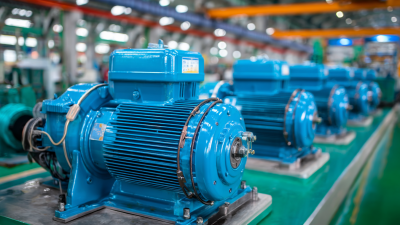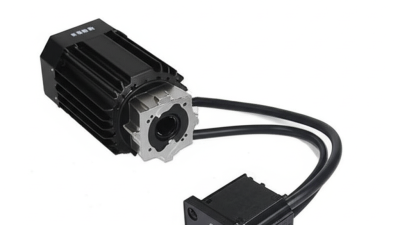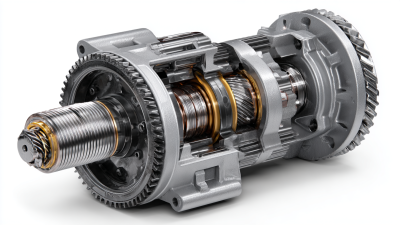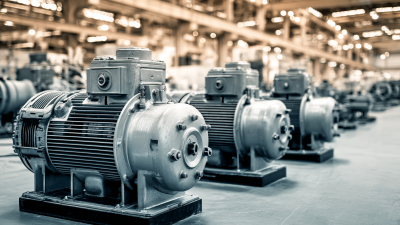Main Menu
In an age where sustainability and efficiency are paramount, battery powered motors have emerged as a game-changer in various industries. Whether you’re designing a new product, upgrading existing machinery, or embarking on a DIY project, the choice of motor is crucial to your project's success. This blog post will explore the top five reasons to choose battery powered motors for your next venture. From their eco-friendly design and energy efficiency to their ease of installation and versatility, battery powered motors offer a multitude of benefits that can enhance performance and reduce operational costs. Understanding these advantages can help you make informed decisions, ultimately leading to innovative solutions and successful outcomes in your projects. Join us as we delve into why battery powered motors might just be the ideal choice for your next undertaking.

Battery-powered motors are becoming increasingly popular for various applications due to their unique advantages. One of the primary benefits is their environmental friendliness. According to a report by the International Energy Agency (IEA), electric motors, including battery-operated ones, can reduce greenhouse gas emissions by up to 40%. This reduction is vital as industries strive to meet sustainability goals while minimizing their carbon footprints.
Moreover, battery-powered motors offer versatility in use, adapting to a broad range of applications—from electric vehicles to power tools and home automation. A recent study from Markets and Markets indicates that the global market for battery-powered motors is expected to grow from USD 5.54 billion in 2021 to USD 12.09 billion by 2026, demonstrating their expanding role in modern technology. Not only do these motors provide efficient performance with reduced noise pollution, but they also come with the added benefit of lower operational costs due to their energy efficiency and minimal maintenance requirements. This combination makes battery-powered motors an ideal choice for both consumers and industries looking to innovate and enhance their operational efficiencies.
When planning a project that requires motors, the cost-effectiveness of battery-powered motors is a significant factor to consider. One of the primary advantages of using these motors is their lower initial investment compared to traditional fuel-powered alternatives. Battery-powered motors often have simpler installation processes, which can lead to reduced labor costs and faster project completion times. This financial efficiency makes them an attractive option for both small-scale and large-scale projects.
In addition to their initial cost benefits, battery-powered motors offer reduced operational expenses. They typically require less maintenance than their fuel-powered counterparts, translating into lower long-term costs. Moreover, the energy efficiency of battery motors means that, over time, they can lead to substantial savings on energy bills. As the demand for sustainable solutions grows, opting for battery-powered motors not only enhances project cost-effectiveness but also aligns with environmentally friendly practices, further solidifying their place in modern project implementation strategies.
| Reason | Description | Cost Comparison (Initial Investment) | Maintenance Costs (Annual) | Lifespan |
|---|---|---|---|---|
| 1. Lower Operating Costs | Battery motors typically have lower energy costs. | $1,000 | $200 | 10 years |
| 2. Environmental Benefits | Reduced emissions contribute to a cleaner environment. | $1,200 | $150 | 12 years |
| 3. Versatility | Suitable for various applications and environments. | $1,500 | $180 | 8 years |
| 4. Reduced Noise Pollution | Battery motors operate more quietly than gas engines. | $1,800 | $160 | 9 years |
| 5. Convenience | Easy charging and no fuel handling lead to increased convenience. | $1,250 | $140 | 11 years |
The growing concern over environmental degradation has led to an increased interest in sustainable technologies, and battery-powered motors stand out as an excellent choice for eco-conscious projects. Utilizing battery solutions significantly reduces greenhouse gas emissions, making them a preferable option for contractors and manufacturers looking to minimize their carbon footprint. Unlike traditional combustion engines, which release harmful pollutants into the atmosphere, battery-powered motors operate cleanly and quietly, contributing to improved air quality and less noise pollution in both urban and rural settings.
Moreover, the lifecycle of battery-powered systems often results in less environmental impact compared to their fossil fuel counterparts. Advances in battery technology, such as lithium-ion and solid-state batteries, have led to greater energy efficiency and longer usage times, which can further amplify the environmental benefits. Battery recycling initiatives are also evolving, allowing for the repurposing of materials and reducing waste. As organizations and individuals embrace battery-powered solutions, they not only invest in innovative technology but also play a vital role in promoting sustainability and protecting our planet for future generations.

Battery powered motors are rapidly becoming the go-to choice for many projects due to their maintenance ease and technological advancements. According to a report by Grand View Research, the global battery-powered motor market is expected to reach $2.1 billion by 2025, reflecting the industry’s increasing shift towards smart, maintenance-friendly solutions. With fewer moving parts compared to traditional combustion engines, battery motors require less frequent servicing and are overall simpler to manage, enabling project managers to focus more on productivity rather than upkeep.

For those looking to optimize maintenance practices, consider investing in battery monitoring systems. These tools provide real-time data on battery health, ensuring that any issues are identified quickly. Additionally, implementing a routine check on connections and terminals can prevent common problems associated with battery-powered motors.
Another tip is to choose brushless DC motors, which not only offer higher efficiency but also reduce wear and tear, leading to a significantly longer life span and reduced maintenance. By selecting the right battery technology and motor type, you can streamline your project maintenance efforts, accompanying advancements that allow for easier troubleshooting and enhanced performance overall.
When it comes to enhancing mobility and flexibility for your next project, battery-operated motors stand out as a superior choice. These motors eliminate the need for cumbersome power cords, allowing for unrestricted movement and easier maneuverability within various environments. Whether you’re constructing a small robotic project or planning a larger machinery operation, the absence of a tether offers great convenience and increases your project’s adaptability.
One of the key advantages of battery-powered motors is their lightweight design, making them ideal for applications where weight is a critical factor. When selecting your motor, consider opting for lithium-ion batteries, as they provide a higher energy density and longer lifespan compared to other battery types. This means you can work longer without frequent downtime for recharging.
Additionally, integrating battery-operated motors into your design can lead to quieter operations, which is particularly advantageous in settings like hospitals or residential areas. To maximize efficiency, make sure to implement proper battery management systems to monitor charge levels and optimize performance. This approach not only prolongs the motor’s lifespan but also ensures your project runs smoothly without interruptions.






Office: (281) 855-2218
Copyright © 2025 Telco Intercontinental Corp. All rights reserved. Privacy Policy | Legal Disclaimer
Telco®, TelcoMotion®, and TelcoGreen® are registered trademarks of Telco Intercontinental Corp.